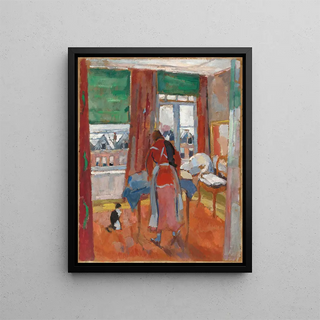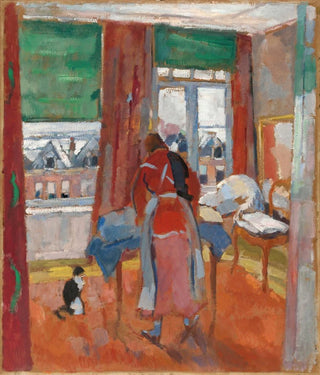Art print | Repassage - Rik Wouters


View from behind

Frame (optional)
Reproduction Repassage - Rik Wouters – Engaging Introduction
In the rich and intricate universe of Belgian art, the artwork "Repassage" by Rik Wouters stands out for its ability to capture the simplicity of everyday life while revealing an unexpected emotional depth. This piece, created in the early 20th century, bears witness to the artist's commitment to exploring themes of intimacy and domesticity. Through a mundane scene of ironing, Wouters manages to evoke a warm and familiar atmosphere, inviting the viewer to immerse themselves in a shared moment of life. The soft light bathing the composition and the delicate gestures of the characters create a visual harmony that transcends the mere act of ironing, transforming this household chore into a true tableau of life.
Style and uniqueness of the work
Rik Wouters' style is characterized by an impressionist approach that emphasizes color and light. In "Repassage," the artist employs fluid and vibrant brushstrokes to bring the scene to life. Pastel shades blend subtly, creating a play of shadows and highlights that adds an almost tactile dimension to the piece. The figures, though stylized, are imbued with palpable humanity, their expressions and postures telling a story of devotion and tenderness. The artist captures a fleeting moment, where everyday life turns into poetry, where each fold of fabric reflects a life full of sweetness. This choice of subject, far from being trivial, evokes nostalgia for simpler times while celebrating the beauty of daily gestures.
The artist and his influence
Rik Wouters, an emblematic figure of Belgian modernism, established himself through his unique style and artistic vision. Born in 1882 in Mechelen, he was influenced by Impressionist and Post-Impressionist movements but developed a distinctive voice marked by a particular sensitivity to the world around him. His work is often imbued with themes related to domestic life, love, and nature, revealing a meticulous attention to detail that echoes his own experiences. Wouters not only

Matte finish

View from behind

Frame (optional)
Reproduction Repassage - Rik Wouters – Engaging Introduction
In the rich and intricate universe of Belgian art, the artwork "Repassage" by Rik Wouters stands out for its ability to capture the simplicity of everyday life while revealing an unexpected emotional depth. This piece, created in the early 20th century, bears witness to the artist's commitment to exploring themes of intimacy and domesticity. Through a mundane scene of ironing, Wouters manages to evoke a warm and familiar atmosphere, inviting the viewer to immerse themselves in a shared moment of life. The soft light bathing the composition and the delicate gestures of the characters create a visual harmony that transcends the mere act of ironing, transforming this household chore into a true tableau of life.
Style and uniqueness of the work
Rik Wouters' style is characterized by an impressionist approach that emphasizes color and light. In "Repassage," the artist employs fluid and vibrant brushstrokes to bring the scene to life. Pastel shades blend subtly, creating a play of shadows and highlights that adds an almost tactile dimension to the piece. The figures, though stylized, are imbued with palpable humanity, their expressions and postures telling a story of devotion and tenderness. The artist captures a fleeting moment, where everyday life turns into poetry, where each fold of fabric reflects a life full of sweetness. This choice of subject, far from being trivial, evokes nostalgia for simpler times while celebrating the beauty of daily gestures.
The artist and his influence
Rik Wouters, an emblematic figure of Belgian modernism, established himself through his unique style and artistic vision. Born in 1882 in Mechelen, he was influenced by Impressionist and Post-Impressionist movements but developed a distinctive voice marked by a particular sensitivity to the world around him. His work is often imbued with themes related to domestic life, love, and nature, revealing a meticulous attention to detail that echoes his own experiences. Wouters not only






